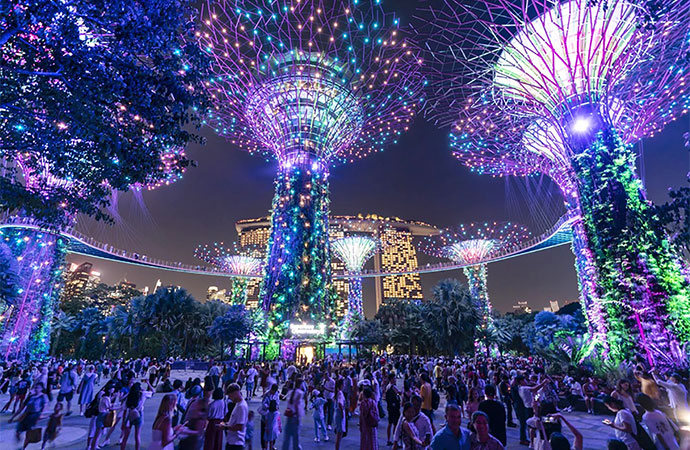Column

Photo: AP/UNB
I arrived in Singapore in 1984 and stayed in a hotel that my employer had booked for me. I stayed in a different hotel that the same employer had booked for me in 1993, when I returned after a year spent studying abroad.
Those are the only two hotels where I have been a guest in my more than forty years in Singapore - naturally, since in this time, I have become a citizen and have my own home. So, Singapore has become an extension of my home in a high-rise public housing estate where I live on the fifth floor. I love my existence, which involves me in the day-to-day lives of my neighbours, beginning with my compatriots in the three units that share the floor with my domain. I cannot even think of living in another place in Singapore. Attachment is the culmination of belonging.
Then, my wife decided to give our son an early birthday present by staying at Marina Bay Sands for a night earlier this month. Although the resort is famous for its casino, it is much more than a mere place for upscale gambling. This is what Marina Bay Sands says about itself: "Since its inauguration in 2010, Marina Bay Sands stands as an architectural marvel, the crown jewel in Singapore's skyline. Home to the world's most spectacular rooftop infinity pool and approximately 1,850 rooms and suites, the integrated resort offers exceptional dining, shopping and entertainment choices, complete with a year-round calendar of signature events and shows."
Yes. At 57 floors above ground level, my son had a grand swim in the infinity pool, and then he, his mother and I caught an expansive view of Singapore from a platform. We had dinner at one of the many haute cuisine establishments housed in the complex before retiring to our room on the 35th floor of one of the three towers that make up Marina Bay Sands' architectural experience. That is when reality turned into romance.
As evening merged into dusk, the skyline became a festival of lights playing out at the top of high-rise buildings comprising the commercial Shenton Way landscape. When dusk turned to night, my eyesight grew sharper. It caught the lights and recognised the names of the business houses, as well as the expansive swathes of vegetation and water that kept Singapore tropical amidst its concrete success. My eyes surveyed the city-state's self-propelled graduation from a colonial entrepot of infested slums that had boasted sprinklings of big business houses, to an elegant metropolis that could afford to situate Marina Bay Sands in its affluent midst. Insomnia overcame me. Every now and then, I looked out of the giant window of the room to witness a Singapore from above that I had never seen before.
Then, morning came, I fell asleep, and woke up soon enough to leave the hotel for home. But Singapore would never be the same again. I had seen its transformation over the decades from the high floor of a hotel which itself embodied the capacity of nations to rise over their geographical destiny and reach for the skies.
Lee Kuan Yew
Singapore will celebrate the 60th anniversary of its independence on August 9 this year. The man responsible for its continued existence, its founding Prime Minister Lee Kuan Yew, passed away in March 2015. An American commentator had averred that the "honesty and efficiency" which Mr Lee had brought to the country were "likely to follow him to his grave". That prediction has not come true in a decade and it is unlikely that it will come true in the next because Mr Lee built sturdy institutions - including the judiciary, the civil service, the military, and the foreign affairs and intelligence services - that would outlast him. They have done so, and show no signs of decay.
Marina Bay Sands offers a bird's eye view of Singapore's financial skyline that is upheld by a citizenry which is protected by the institutions that Mr Lee has left behind. Of course, the national skyline is not the personal bottom line. Singapore is not free of the laws of economic gravity. As elsewhere in the globalised world, development has exacerbated economic divides in Singapore, and the rising cost of living everywhere is felt in the country (but is buttressed by the strength of the Singapore dollar and by ameliorative government subsidies).
However, the system survives because the principles and the processes that have gone into its creation - honesty and efficiency being the two cornerstone principles - continue to prosper. Mr Lee's greatest gift to Singapore lies in its ability to survive without him.
Looking out of the 35th floor of my hotel reminded me of the importance of what I would like to call "skyline politics". By that I mean the readiness and the capability of national leaders to take a bird's eye view of their economic terrain of their nations, decide on what needs to be done institutionally and administratively to improve lives on the ground, do so without tolerance of corruption and inefficiency, and be open-minded so that they can discard policies which do not work and dispense with people who cannot deliver the goods. Lee Kuan Yew did all that.
That is why it was possible for me to fall in love with Singapore again from the 35th floor, and to return to my fifth-floor flat, love triumphant.
The writer is Principal Research Fellow of the Cosmos Foundation. He may be reached at epaaropaar@gmail.com

























Leave a Comment
Recent Posts
Pedaling Through the Mangroves ...
The journey from the bustling streets of Barishal to the serene, emera ...
Why the Interim Government mus ...
Two weeks out from what is expected to be a red letter day in the figh ...
Doesn’t matter who thinks what about Bangladesh deci ..
The Other Lenin
US President Donald Trump said his administration
Govt moves to merge BIDA, BEZA, BEPZA, MIDA